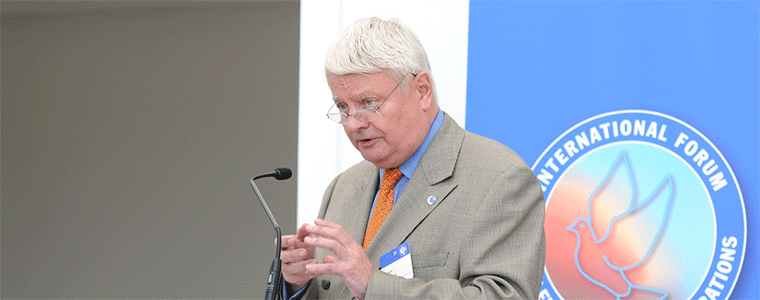Strategic Communications for a New Era of U.N. Peace Operations
As conflicts worldwide increasingly include sophisticated information warfare, the United Nations needs to build smart public communications strategies into every peacekeeping mission it deploys. This problem and concrete steps to solve it are the focus of a workshop which was webcast from USIP on June 23. The event was one of a global series of conferences, called the Challenges Forum, that is shaping broad recommendations for improving U.N. peace operations.

Combatants in global conflicts are waging agile information warfare—from polished videos by extremist groups, to their leaders’ Twitter feeds or websites. And even in zones once isolated from global information, United Nations peacekeeping missions now deploy among populations that are growing connected via cellphones and the internet. More than ever, such U.N. missions need strategic communications to succeed.
USIP and the Swedish government’s peacebuilding arm, the Folke Bernadotte Academy co-hosted this event with the International Forum for the Challenges of Peace Operations, a network of governments, research centers and groups dedicated to improving U.N. peacekeeping.
Continue the conversation with #peacecomms. For all the details, please see the full agenda.
Watch the complete video archive of this event here.
Invited speakers include:
Opening and Welcome
- Ms. Nancy Lindborg
President, United States Institute of Peace - Mr. Sven-Eric Söder
Director-General, Folke Bernadotte Academy - Ms. Annika Hilding Norberg
Director and Founder, Challenges Forum
Peace Operations and Strategic Communications – Challenges Today
- Mr. Nick Birnback, Moderator
Director, Public Affairs, Department for Peacekeeping Operations and Field Support, United Nations - Mr. B. Lynn Pascoe
Member, U.N. Secretary-General’s Independent Panel on Peace Operations, United States - Ms. Yasmina Bouziane
Chief Communication and Public Information Office, MINUSTAH - Mr. Marsden Momanyi
Strategic Communications Officer, Peace and Security Department, African Union
Strategic Communications – What are the Best Practices Today?
- Mr. Peter Loge, Moderator
Vice President, External Relations, United States Institute of Peace - Dr. Christina Schori Liang
Senior Programme Advisor and Senior Fellow, Geneva Centre for Security Policy, Switzerland - Mr. Jon Haber
Director, Cascade Strategy - Ms. Sarah Coppersmith
Vice President, Scott Circle
Luncheon - Speakers
H.E. Hervé Ladsous, Under-Secretary-General for Peacekeeping, United Nations, introduced by Ambassador George Moose, Vice-Chairman, United States Institute of Peace
Innovation for Strategic Communications – Moving the Strategic Communication Frontier Forward
- Mr. Sven-Eric Söder, Moderator
Director-General, Folke Bernadotte Academy, Sweden - Mr. Peter Yeo
President Better World Campaign, Vice President for Public Policy and Advocacy, United Nations Foundation - Ms. Stephanie Dreyer
Director of Digital Media and Strategy, Office of the Secretary of Defense, Public Affairs, Department of Defence, United States - Mr. Daniel Stauffacher
President, ICT4Peace Foundation, Switzerland



